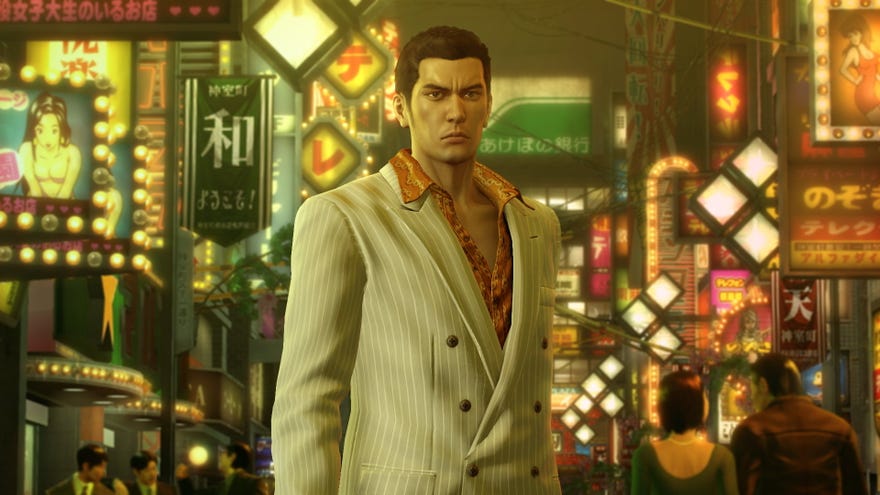What order should you play the Yakuza games?
Follow along with our very own LAD bible
With Yakuza games (or Like A Dragon, as it's now known) on the rise here in the West, I see more and more people ask the question:"What order should I play the Yakuza games in?". Not only does it warm my heart, it also gets to me. To experience the series in the richest way possible, there's an obvious answer. But if you're someone who hasn't got all the time in the world, or you're a bit unsure whether Yakuza is the right fit for you, then there's another way in. Now pick up that bike and walk with me.
What order should you play the Yakuza games?
In my humble opinion, the best way to get into Yakuza is from the very beginning, even if it's a long road. Start with Yakuza 0, then work your way through them (mostly) chronologically like so:
- Yakuza 0
- Yakuza Kiwami
- Yakuza Kiwami 2
- Yakuza 3 Remastered
- Yakuza 4 Remastered
- Yakuza 5 Remastered
- Yakuza 6: The Song Of Life
- Yakuza: Like A Dragon
- Like A Dragon Gaiden: The Man Who Erased His Name
- Like A Dragon: Infinite Wealth
- Like A Dragon: Ishin!
In fairness, there are two other options you can take. If the thought of catching up on eight Yakuza games fills you with dread, Yakuza: Like A Dragon is your next-best starting option. It's very much a clean-break from the mainline Yakuza series and takes place after the events of Yakuza 6. It features a whole new cast of characters, too, so you won't miss out on any major story beats. There's certainly something to be gained from having played all the other Yakuza games first, if only to appreciate the sweeping changes it makes to the series, but it's still a great entry point regardless.
 Yakuza: Like A Dragon's RPG Combat Is Ace | My Favourite Thing In... (Yakuza: Like A Dragon Review)
Yakuza: Like A Dragon's RPG Combat Is Ace | My Favourite Thing In... (Yakuza: Like A Dragon Review)
Alternatively, if you're a real chronology buff, then you should probably start with Like A Dragon: Ishin!, which is a standalone story set several hundreds years before the mainline series. A lot of its all-star cast are handpicked from Yakuzas 0-6, though, so some of its references might be lost if you're coming in fresh. Personally, I'd say this is best played at the end of your Yakuza journey, but you can also easily hop into it at any point and still have a good time. Do play a bit of Yakuza 0 first, though.
Ultimately, Yakuza's ongoing story threads and recurring cast of characters do make this a series best played in chronological order. This is the approach I took, and I'm glad I did! With Yakuza 0, you begin with arguably the best game in the entire series, all while gaining an invaluable grounding in main-man Kiryu's origin story. Then, as you move into Yakuza Kiwami (a remaster of the first game released in the series), you'll fully comprehend the magnitude of everyone's actions. And crucially, over the course of Kiwami 2, then 3, and so on, you won't ever question yourself, like, "Am I missing something here?"
So read on below for our full order ranking, which details where they sit in the series as a whole, and how they stack up to the other Yakuza games.
Yakuza 0
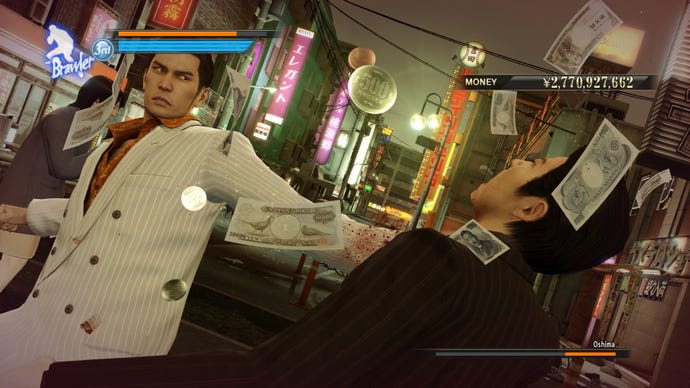
Not only is Yakuza 0 the best Yakuza game, it's the one you should start with. Why? Because it's two origin stories wrapped up in a 1980s Kamurocho that overflows with the mightiest minigames, and easily the series' most iconic characters: Mr. Libido, Mr. Shakedown, Pocket Circuit Fighter, the list goes on. The game sees you flit between two storylines, that of a young Kiryu and a young Majima, both of whom see themselves plunge deeper and deeper into the Yakuza's murky underbelly.
While the game's story is admittedly a slow-burn, once it gets going, you won't be able to put it down. Majima's story is particularly special, as he's the strongest personality of the two, whose jaunts around Sotenbori (based on Osaka's Dotonbori) evolve into a tragic tale of loyalty and love. Yakuza 0 isn't only an essential game, it's the essential grounding in Yakuza you need to move forwards into the rest of the series.
Yakuza Kiwami
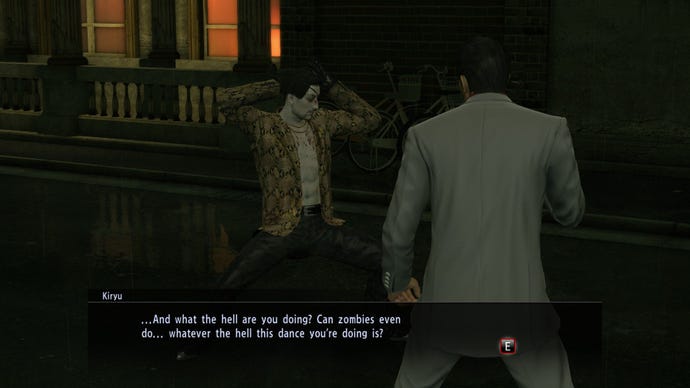
Where Yakuza originally started, all the way back in 2005, but remastered! Yakuza Kiwami kicks off with our boy Kiryu as he takes the fall for the murder of a crime boss to protect his sworn brother, Nishikiyama. Then there's a ten-year time skip as Kiryu is released from prison (this is a theme), and he re-enters an organisation that's taken a very different turn.
Aside from Majima (Kiryu's frenemy) pursuing you to hilarious effect, I wouldn't say Yakuza: Kiwami is all that strong an entry. It's got a decent story, but when compared to Yakuza 0 or later entries, its combat, side stories and minigames just aren't as exciting or interesting. Stick it out for the story and it's sequel...
Yakuza Kiwami 2

Ryu Ga Gotoku Studios remade Yakuza 2 in the Dragon Engine, giving it an entire graphical overhaul, a new "Majima Saga" bit of the story, and some updates to already excellent minigames. Yakuza Kiwami 2 is, by far, one of the best entries in the entire series. Why? Kiryu fights in a laser-focused arc to become the dragon, as there's another guy called Ryuji Goda (a brilliant villain) who reckons he's got the upperhand. Chuck in a touch of unexpected romance, too, and you've got a potent cocktail of thuggery and emotion.
Without spoiling anything, Majima's special story bit legitimately made me cry. It features a certain encounter which will mean everything to you if you've played Yakuza 0. Oh, and the Cabaret Club management minigame is an all-consuming delight, with its own story to tell. You can also drop kick a tiger.
Yakuza 3 Remastered
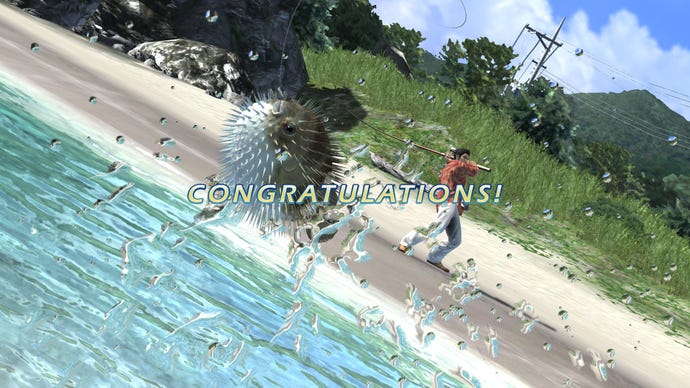
I'd argue Yakuza 3 Remastered is the weakest of the bunch, not to mention that you step down from Yakuza Kiwami 2's shiny engine - and general excellence - to a remaster that can't hide the game's age. The story sees Kiryu and his adoptive daughter Haruka escape to the sunny shores of Okinawa to run an orphanage, which is really sweet, to be fair. But, as is the way of things, Kiryu is pulled back to Kamurocho thanks to clan conflict that threatens his peaceful island life.
The minigames and side quests can be a great laugh, Okinawa is a lovely locale, and the combat's fine, but I'd treat Yakuza 3 like Yakuza Kiwami: play it for the story and move on.
Yakuza 4 Remastered
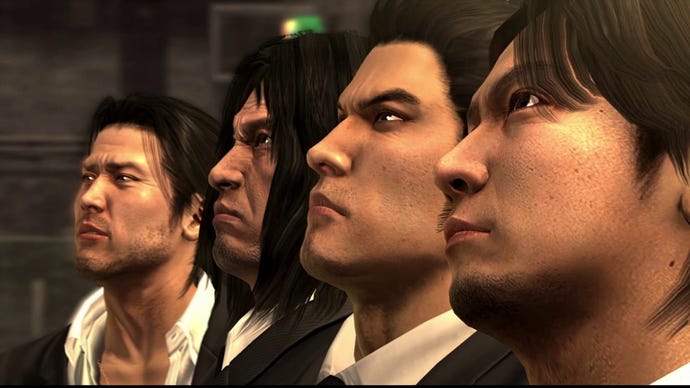
The upwards trajectory begins anew, as Yakuza 4 Remastered lets you play as four different characters, each with their own stories that eventually overlap. Two of the bunch, Shun Akiyama and Taiga Saejima, aren't only great characters with interesting histories, but they're fellas who reappear a lot later in the series.
Truthfully, it's Shun Akiyama's story which shines here. He's charismatic, funny, and has a fighting style that's as flashy as his personality. He also shares a great relationship with his assistant Hana. Play it for Akiyama.
Yakuza 5 Remastered
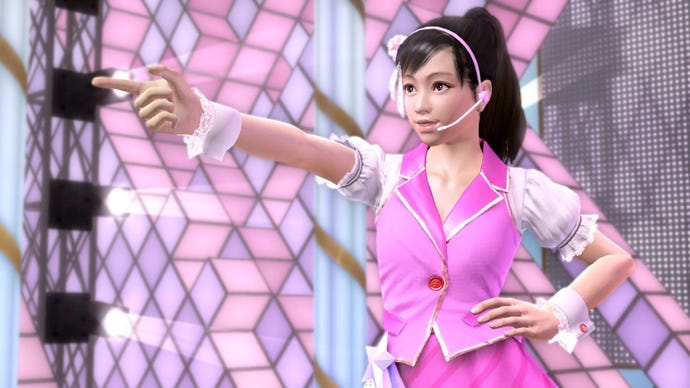
Yakuza 5 Remastered holds a special place in my heart as "The Fuck Off Massive One With Real Charm". Yakuza 4 may have featured four protagonists, but well, Yakuza 5 goes one further. The story is sweeping, and at times, not really a lot to do with Kiryu. It gets a lot of flack for this, but I reckon it's fine. Not everything has to be about Kiryu, and the other stories help flesh out characters with great importance to the series anyway.
Still, if we're talking about Kiryu, he starts off as a cab driver, laying low after the events of Yakuza 4. Slowly, steadily, clans begin to rumble and he'll be drawn - yet again - into a power struggle. Then as you switch between characters you'll get to visit some other cities for the first time, like the snowy Sapporo or the buzzy Nagoya. Really, the biggest treat is being able to play as Kiryu's adoptive daughter Haruka, as she pursues her dreams of becoming a Jpop idol. Fights are replaced by dance battles. You get to sign autographs. It's literally an idol simulator and it's absolutely wonderful.
Yakuza 6: The Song Of Life
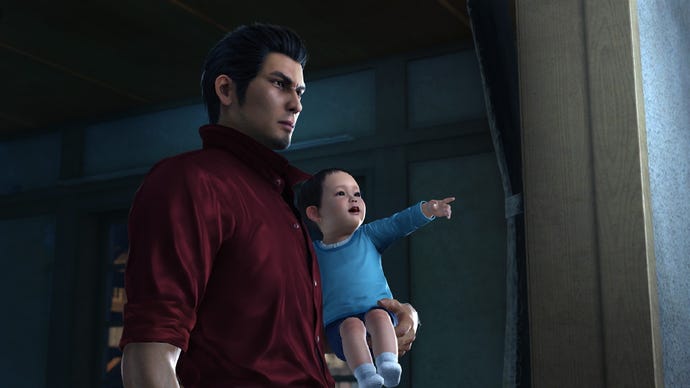
Yakuza 6: The Song Of Life sits right up there with Yakuza 0 and Kiwami 2 as one of the series' greats. Fresh out of jail, Kiryu finds that Haruka has gone missing. Then discovers that she has a son?! And so, Kiryu enters dad mode and journeys to the port town of Onomichi to discover what evil stuff the Hiroshima criminal underworld's been cooking up.
I adore Yakuza 6 because it shows a different, fatherly side to Kiryu. Onomichi might be one of my favourite locations in the series, too, all quaint and sunny and lovely. Not to mention that it's about Kiryu grabbing hold of a criminal organisation whose lost its way. He's someone with values and he will fight to instill them in a generation where those values are beginning to slip.
Yakuza: Like A Dragon
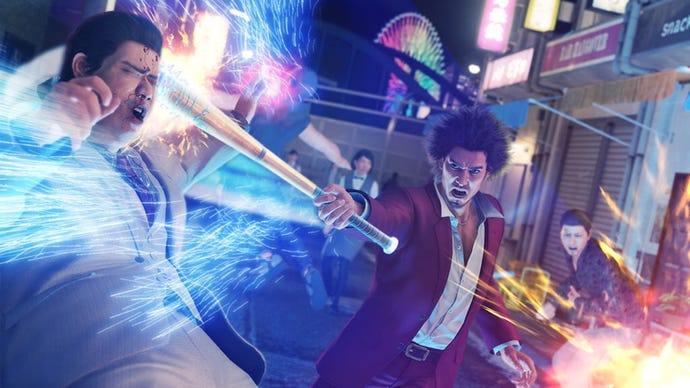
I gave Yakuza: Like A Dragon a bestest best in my review, for good reason. It's the first Yakuza to swing a bicycle at the series and give the series a total refresh, transforming the series from a real-time action game into more of a traditional turn-based RPG. The charismatic Ichiban Kasuga takes the reins, with an origin story that sees him take the fall for a crime he didn't commit (sound familiar?), then return to a savage betrayal by a man he respected the most.
The turn-based combat isn't without its flaws, but it's still a grand time and it introduces a cast of pals who you'll fall in love with. You can take on different Jobs, and be a Chef who fights with a ladle, or a Musician who heals with the power of strings. The new locale Yokohama is vast and vibrant, with some of the funniest, most heartfelt stories yet.
Technically, you could play this as your first Yakuza and still have a grand time. But you'd be missing out on lots of the references, and you'd also some appreciation for how important a shift the game represents for the direction of the series.
Like A Dragon Gaiden: The Man Who Erased His Name

Like A Dragon Gaiden: The Man Who Erased His Name hasn't only got the most ridiculous name of the lot, I'd say it's one to avoid if you're a newcomer to the series. This is because it's not a fully-fledged Yakuza game, in the sense that it's only 20-hours or so in length (roughly half of your usual Yakuzas) and acts as a stop-gap that sums up Kiryu's activities between the end of Yakuza: Like A Dragon and Like A Dragon: Infinite Wealth.
Technically, yes, you could play this as a newbie. But you'd be far better off coming into this knowing Kiryu and what he's been through. The weight of the story very much leans on his rocky past and, crucially, the things he holds dearest: family ties. Go in blind and you'd also miss out on crossover with Yakuza: Like A Dragon, where you might just bump into familiar faces.
In my LAD Gaiden review, I was a bit mixed on its story beats and its side activities. You've effectively got agent Kiryu here, with Yakuza's real-time combat elevated by silly gadgets and an absolutely fantastic colosseum minigame, where "mini" is doing it a massive disservice. On the other hand, I find it doesn't really provide a compelling reason as to why Kiryu's back yet again, and 90% of what you do in the game ends in a battle, which can wear you down quickly.
Is it essential? Probably not. But if you're a fan who's played them all, then I'd say it's worth giving a crack.
Like A Dragon: Infinite Wealth

Yakuza 0, Kiwami 2, Yakuza 6, Yakuza: LAD... and now Like A Dragon: Infinite Wealth. Welcome pal, you've just joined the ranks of my favourite Yakuza games ever. In my Infinite Wealth review, I slapped a Bestest Best badge on it for good reason. Not only does it whisk Ichiban off to a wonderful new location Hawaii, it gives you a chance to play as Kiryu in Yokohama as he battles ailing health. The story is deeply personal and one of the series' standouts.
Story aside, the game features numerous tweaks to the turn-based combat and the reward loop in general. Little things, like your personality traits or bonds with pals, now tie into activities that motivate. All wrapped up in a Yakuza package that doesn't lose sight of what makes Yakuza, Yakuza: depth, silliness, and warmth. Oh, and there's a great Animal Crossing parody and Pokémon parody bundled in with it too, with the AC parody large enough to be its very own game.
As you've probably gathered, Infinite Wealth is a direct follow-up to Yakuza: Like A Dragon (7). With this in mind, I'd say you'd almost certainly want to play Yakuza: LAD first. Why? You'd miss out on Ichiban's origin story, how he met his pals, who his pals are, and the context of Infinite Wealth's improvements. Yakuza: LAD may be a lengthy undertaking, but you'd hamstring your enjoyment of Infinite Wealth having not played it.
Like A Dragon: Ishin!

As I mention in my Like A Dragon: Ishin review, I like to think of Ishin as a bit of theatre. It features an all-star cast from across the series taking on totally different roles and names - aside from Kiryu, who's very much like Kiryu - in a late Edo samurai setting.
While the story is a deadly serious murder mystery embroiled in a tussle between loyalists and the shogunate, it's no slouch when it comes to side silliness. You can bet on chickens or tend to your own allotment out in the sticks, trading homemade pickles for cash. Ishin could also be considered a great starting point for newcomers, as the game comes with no baggage. But it's equally as strong if you've played any of the previous entries, as you'll get references to past games, or squeal with glee as someone you recognise suddenly comes into shot.
If you're still itching for more Yakuza, then I've got the just the thing for you. Have you considered Judgment and Lost Judgment? Both games are by RGG Studio and share the same DNA as Yakuza. Instead of Kiryu and co, they star an all-new cast headed up by a lawyer turned undercover detective who solves crimes with spin-kicks. I wrote about how they're a solid gateway into Yakuza, too. Again, I'd start with Judgment then move into Lost Judgment for that chronological goodness.
